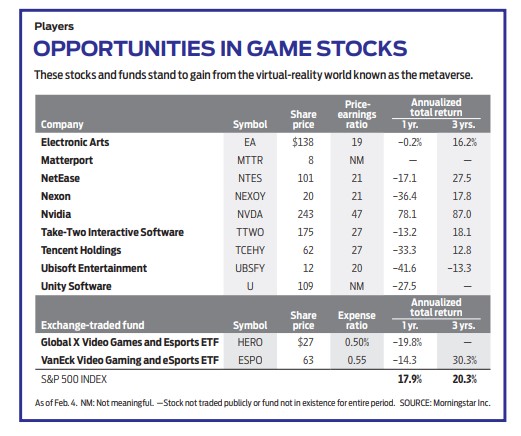How to Win With Game Stocks
Game stocks are the backbone of the metaverse, the "next big thing" in consumer technology.


Profit and prosper with the best of Kiplinger's advice on investing, taxes, retirement, personal finance and much more. Delivered daily. Enter your email in the box and click Sign Me Up.
You are now subscribed
Your newsletter sign-up was successful
Want to add more newsletters?

Delivered daily
Kiplinger Today
Profit and prosper with the best of Kiplinger's advice on investing, taxes, retirement, personal finance and much more delivered daily. Smart money moves start here.

Sent five days a week
Kiplinger A Step Ahead
Get practical help to make better financial decisions in your everyday life, from spending to savings on top deals.

Delivered daily
Kiplinger Closing Bell
Get today's biggest financial and investing headlines delivered to your inbox every day the U.S. stock market is open.

Sent twice a week
Kiplinger Adviser Intel
Financial pros across the country share best practices and fresh tactics to preserve and grow your wealth.

Delivered weekly
Kiplinger Tax Tips
Trim your federal and state tax bills with practical tax-planning and tax-cutting strategies.

Sent twice a week
Kiplinger Retirement Tips
Your twice-a-week guide to planning and enjoying a financially secure and richly rewarding retirement

Sent bimonthly.
Kiplinger Adviser Angle
Insights for advisers, wealth managers and other financial professionals.

Sent twice a week
Kiplinger Investing Weekly
Your twice-a-week roundup of promising stocks, funds, companies and industries you should consider, ones you should avoid, and why.

Sent weekly for six weeks
Kiplinger Invest for Retirement
Your step-by-step six-part series on how to invest for retirement, from devising a successful strategy to exactly which investments to choose.
In one of the most volatile episodes in stock market history, investors early last year took the shares of a company called GameStop (GME) on a wild ride that few would have expected for a business that's mostly a brick-and-mortar antique, the gaming version of a chain of video stores. Its shares went on an adventure that echoed the characteristics of the video games on its shelves: fantasy, violence and a romantic quest for justice and vengeance.
In real life, however, GameStop has had a lousy year, losing money once again. But the rest of the gaming sector has taken up the mantle. It's booming, becoming the backbone of the metaverse, a three-dimensional online environment that is likely the "next big thing" in consumer technology.
In 2020, partly because the pandemic kept Americans indoors, gaming revenues exceeded those of movies and sports events combined. Global gaming sales in 2021 are estimated at $178 billion and projected to rise to $269 billion by 2025. According to the consulting firm Accenture, one out of every three people in the world is a gamer.
From just $107.88 $24.99 for Kiplinger Personal Finance
Become a smarter, better informed investor. Subscribe from just $107.88 $24.99, plus get up to 4 Special Issues

Sign up for Kiplinger’s Free Newsletters
Profit and prosper with the best of expert advice on investing, taxes, retirement, personal finance and more - straight to your e-mail.
Profit and prosper with the best of expert advice - straight to your e-mail.
No wonder so many big tech players are investing in the business. In 2000, Microsoft (MSFT, $306) launched the game-playing console Xbox, and in 2014 the company bought Minecraft, a survival-themed game, for $2.5 billion; Minecraft now has 131 million active monthly users. In January, Microsoft announced that, pending regulatory approval, it will spend $69 billion to purchase ActivisionBlizzard (ATVI), which has 400 million gamers a month playing such popular titles as Call of Duty and World of Warcraft.
Trying to stay abreast, Sony Group, maker of the wildly popular PlayStation console, announced Jan. 31 that it was buying Bungie, the private developer of the Halo and Destiny franchises, for $3.6 billion. (Stocks I like are in bold; share data are as of Feb. 4.)
Amazon (AMZN, $3,153) entered the market in 2014 with the purchase of Twitch Interactive for $970 million. Twitch lets gamers livestream themselves to viewers, who can watch and comment. Twitch has about 8 million active users. It dominates the market, but competition is growing from such big players as Alphabet (GOOGL, $2,866), with YouTube Live; and Meta Platforms (FB, $237), the former Facebook.
Facebook, walloped by a disappointing revenue projection for the first quarter of 2022, has thrown in its lot with the metaverse. It’s an idea with roots in Second Life, a computer game Facebook created in 2003. When I was a State Department official, my avatar gave an interactive speech in 2008 with the avatars of pro-democracy Egyptian students. In the metaverse, you can go to concerts, hold business meetings where you are immersed in, say, a construction site or restaurant, or drop down onto a virtual football field and run a few plays. The key for investors is that the metaverse depends on technology developed for video games.
How to Get in on Game Stocks
The metaverse, with its promise of interconnected worlds, may be the next frontier for gaming, but for investors, gaming poses challenges. You could buy the tech giants because gaming is a growing part of their businesses, but recognize that it is dwarfed by, say, online retailing, cloud computing and advertising. And many of the best developers of video games are private firms, so you can't invest in them. So, what are the best pure plays to take advantage of a craze that could still be in its infancy?
Look first to the companies that make the games. Many games today are so sophisticated that they can cost as much to make as the most dazzling Hollywood films. Grand Theft Auto 5 required 250 programmers and other employees of Rockstar working for five years at a total expense of $265 million. That's more than the films "Titanic" or "The Dark Knight Rises." The investment paid off. GTA5 has grossed more than any movie ever made.
Take-Two Interactive Software (TTWO, $175) owns the Rockstar label and has been gobbling up smaller developer firms, including Zynga (maker of FarmVille, a huge hit that was introduced as an app in 2009). Take-Two, with a market value of $18 billion, is solidly profitable, but shares have dropped about 20% in the past two years. With a market cap of $37 billion, well-managed, independent developer Electronic Arts (EA, $138), makes such games as Battlefield, The Sims and Madden NFL. It trades at a reasonable price-earnings ratio of 18.
Nvidia (NVDA, $243) makes semiconductors for a variety of sectors, but, as the world's largest designer of graphic processing units, its chips are popular in video games, including those that create virtual environments for immersion in the metaverse. In its latest quarterly report, Nvidia reported that gaming revenues rose 42% and are approaching half of the company's total sales. Still, shares fell by nearly one-third in the first three weeks of 2022, creating a buying opportunity.
Other metaverse stocks were also caught in the undertow of fears of higher interest rates and falling valuations. With a market cap of $30 billion, Unity Software (U, $109), which operates a development platform for the software that powers complex games, fell in price by about half from November to January, despite a surge in revenues. Over the same period, Matterport (MTTR, $8), which captures the feel of interior space with its 3D cameras, dropped by two-thirds, even though analysts see revenues rising in 2022 from $109 million to $160 million. The company is still unprofitable, and its $2.6 billion valuation is lofty, but if you can tolerate risk, Matterport could be a good long-term investment.
A few exchange-traded funds focus on gaming stocks. Global X Video Games and Esports (HERO, $27), with an expense ratio of 0.50%, was launched in 2019. Among the top holdings are NetEase (NTES, $101), a large Chinese developer, and Ubisoft (UBSFY, $12), a mid-cap French maker of such games as Rainbow Six Extraction and Just Dance.
With expenses of 0.55%, Van Eck Video Gaming and eSports (ESPO, $63) dates from 2018, with a small portfolio similar to that of the Global X ETF. Both funds lean toward high-profile stocks such as Nvidia and Electronic Arts, but one notable highlight of the Van Eck ETF is NEXON (NEXOY, $20), a Japanese firm with an emphasis on the fast-growing Asian market. Unlike many other gaming companies, Nexon's shares have been rising since last fall. Van Eck's top asset is Tencent Holdings (TCEHY, $62), the giant Chinese social media company that is, by some calculations, the largest gaming business in the world through its online offerings. Tencent has suffered from Chinese government intervention, so there's political risk to consider.
Game stocks carry the likelihood of substantial returns – perhaps, if regulators allow, through acquisitions by giants such as Alphabet, Microsoft and Sony. And their prospects, unlike the plotlines of many of their products, are built on a real-life foundation.
These stocks and funds stand to gain from the virtual-reality world known as the metaverse.

James K. Glassman chairs Glassman Advisory, a public-affairs consulting firm. He does not write about his clients. His most recent book is Safety Net: The Strategy for De-Risking Your Investments in a Time of Turbulence. Of the stocks mentioned here, he owns Amazon, Microsoft and Nvidia. Reach him at James_Glassman@Kiplinger.com.
Profit and prosper with the best of Kiplinger's advice on investing, taxes, retirement, personal finance and much more. Delivered daily. Enter your email in the box and click Sign Me Up.
